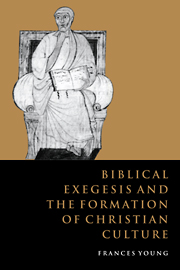Book contents
- Frontmatter
- Contents
- Preface
- List of abbreviations
- Introduction
- PART I EXEGESIS AND THE UNITY OF THE SCRIPTURES
- PART II THE BIBLE AS CLASSIC
- PART III LANGUAGE AND REFERENCE
- PART IV THE BIBLE AND THE LIFE OF FAITH
- Conclusion and retrospect: towards an outline historical account
- Bibliography
- 1 Index ofbiblicaI references
- 2 Index of modern scholars
- 3 Index of subjects
PART III - LANGUAGE AND REFERENCE
Published online by Cambridge University Press: 02 December 2009
- Frontmatter
- Contents
- Preface
- List of abbreviations
- Introduction
- PART I EXEGESIS AND THE UNITY OF THE SCRIPTURES
- PART II THE BIBLE AS CLASSIC
- PART III LANGUAGE AND REFERENCE
- PART IV THE BIBLE AND THE LIFE OF FAITH
- Conclusion and retrospect: towards an outline historical account
- Bibliography
- 1 Index ofbiblicaI references
- 2 Index of modern scholars
- 3 Index of subjects
Summary
In addition to the importance of intertextuality, critical theory has latterly reminded us of the problematic relationship between language and its referent. For the Fathers, reference constituted meaning, and inappropriate interpretations could be challenged by consideration of that to which the language referred. Although language could have a ‘biblical meaning’ discernible by multiplying cross-references, text being interpreted by text, ascertaining reference was far more fundamental to patristic exegesis than determining the sense of the words. Discussion of the traditional ‘senses of scripture’ (literal, allegorical, tropological and so on) does not provide a key to method as such. A complex grid of ‘reading strategies’ plotted against a typology of multiple senses illuminates a fundamentally ‘sacramental’ understanding of the meaning of scripture: the linguistic sign represented the reality to which it referred, whether transparently or obliquely.
- Type
- Chapter
- Information
- Biblical Exegesis and the Formation of Christian Culture , pp. 117 - 118Publisher: Cambridge University PressPrint publication year: 1997



